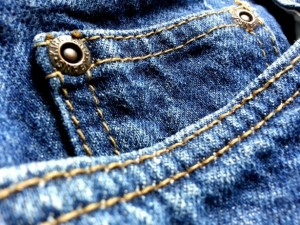
Lately I’ve found myself with a conundrum. In short: I needed new jeans and socks, but am looking now for products not only made sustainably, but also fairly, with fair wages and safe working conditions. I was a consumer on a mission, and finding the products I wanted turned out to be easier than I imagined.
First, socks. Socks are a pretty simple purchase, and I was not looking to spend too much for a pair. But what does a pair of “sustainable” socks even mean? Since there are so many definitions of that popular buzzword out there, I had to decide what “sustainable” meant to me.
I am a huge proponent of the “Cradle to Cradle” design ethos, coined and extrapolated on by Michael Braungart and Willieam McDonough in their 2002 book of the same name. Basically, a product must be designed to eventually be recycled or biodegraded in its entirety, not thrown away in a landfill. The materials in products continue to be used, whether that is in industries, such as the case of metals or plastics, or by the earth, in the case of biodegradable products. Furthering my own definition, I wanted products that minimized the use of fossil fuels during their creation.
What does this mean for socks? Ideally, my sustainable sock would be made from 100% organic cotton (minimizing fertilizers from fossil fuels and pesticides that hurt wildlife), fair trade certified, and biodegradable, all while reducing fossil fuels used in production. 100% cotton was also better for my health, as polyesters and plastic-based fibers have been shown to off-gas some very not-so-good chemicals. Still, that’s a lot of criteria!
Turns out, searching “biodegradable socks” doesn’t necessarily turn up a lot of good results in Google, but one company did catch my eye. “Ecosox” makes their products out of bamboo, which uses less water then cotton and theoretically is biodegradable. However, I was a little doubtful about the latter claim, as the socks came in very bright colors and patterns. Inks can be toxic, and nowhere did I see any information about “all-natural” dyes. Additionally, I had no idea if making fiber out of bamboo took more energy than cotton. Still, I ordered two $4 pairs, just to try it out.
I wasn’t satisfied, so upon further searching I found PACT, a company that wants its clothes to change the world. They specialize in t-shirts, underwear, and socks (yes!) with 100% cotton products and also fair trade certified products. For all of their items, 10% of a customer’s purchase goes back to a community project somewhere around the world. They were still using colorful dyes, but something on their website caught my eye. While as of yet there was no way to completely recycle their clothing products, they hoped that by the time the life cycle of their clothing had ended they would find a way! Sure, no solution yet, but points for at least recognizing the issue.
So far so good, but it was the windmills that convinced me to click “add to cart.” Their socks are made with 100% wind power, as the factory where they create their colorful sock patterns is completely powered by wind energy!

My sock purchases covered for now, I moved on to jeans. Boy was that not a fun experience. Jeans themselves are incredibly wasteful, each one needing 2,600 gallons of water for its creation and using more fiber to boot. Some companies claimed to have organic cotton jeans, others, like Levi’s, had a style that used recycled water bottles, but all broke the bank at well over $100 and were simply not an option. What to do?
I still wanted to avoid business as usual, which meant heading to the mall. Instead, I stopped by Fifi’s, a consignment boutique on West Main Street right here in Durham. If I couldn’t find a new pair of sustainable jeans, I could at least purchase a pair that theoretically created no new negative externalities. As with my new socks, it wasn’t a perfect solution, but it was one I could be comfortable with.
Consumers have a lot of power that could be used to strengthen the environmental and sustainability movement. The more we financially support companies trying to make sustainable products, the more superior their products will be. There are better products and decisions out there, and while it may take a little extra time, a little extra research, or a little extra money, it’s well worth it. Though my purchases were small, they were not only better for me from a health standpoint (organic cotton) but also better for my peace of mind!


I purchased bamboo bath towels which looked soft and comfy but find they don’t dry well – just sort of slide around. And take forever in the dryer so end up hanging them up after a short cycle. I will make sure 100% cotton next time.